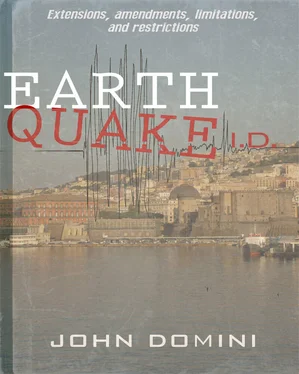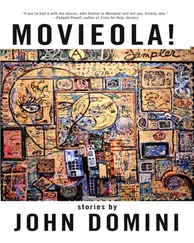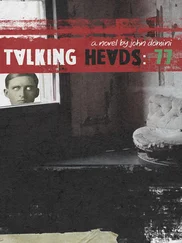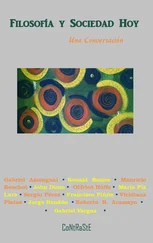Even the commerce going on, the bills unfolding and changing hands, struck her as part of the show. Another flutter of gladrags. This even though Barbara knew how hard it could be to get by, around the ransacked Bay, and though she didn’t fail to notice the ill-nourished Senegalese or Eritreans who manned the more decrepit of the open-air markets. Nevertheless, to her the Euros could look like Monopoly money. A tourist’s delusion, this was, and stupid of her, and whenever Barbara scolded herself for it, she had the impression that she’d been deluded — infected — by history. She couldn’t separate the buying and selling, and the false fronts that went with it, from the history. The displays shrieked for impulse buys, here as much as when she drove the Bridgeport bypass, but in so ancient a setting the pitch to feather your nest, your flimsy and rotting nest, looked inherently nutty. The very name of the city seemed at the same cross-purposes, an expression three thousand years old that meant, roughly, New & Improved! . Barbara thought of a hustler working in a museum. In fact the Museo Nazionale was close by, with a thousand imitation antiquities on sale. She didn’t need Chris to tell her that, under all the daily deal-making, the foundations went back long before Christ was a carpenter.
“This whole trip was an act,” she told her chosen priest. “That’s what I realized, that first day. It was the old shuck and jive, when we came to Naples.”
“Really? And the refugees of the earthquake, the terremotat? They’re children of God, don’t you know, neglected children.”
She shook her head. “I’m not saying it’s not good work, what Jay came here to do.” Back in Bridgeport, her husband had brought home a DVD put together by the relief agencies, a documentary on the quake damage. Some of the scenes had disturbed her as deeply as the materials from the Samaritan Center.
“Good work, well. God’s work, rather.”
“Yes, Father, but for Jay and me that was just the cover story.”
“Cesare, please.”
“Cesare, that was our story , doing God’s work. But then came our first morning in Naples, our first time out in the sunlight. As soon as Jay went down, I saw this trip for the farce that it was.”
The old priest eyed her, his mouth a red fold in a wall of limestone or chalk. Barbara had to remind herself that he had no trouble with her English; he’d done his seminary work in Dublin.
“Though the Jaybird,” she went on, “he’s sticking to the story. He keeps talking about the Refugee Center, saying the kids and I, we should visit.”
“As indeed you ought,” Cesare said, “if you do intend to stay.”
Barbara’s dress was binding under the arms again. She wished that she and this man were using the confession booth.
“If you do intend to stay…”
“Cesare, what am I telling you? I’m telling you, it’s not so easy for me.”
“No need to shout.” He waved a heavy-nailed hand at the empty pews.
“I know what I need to do. I can feel it, Father, like I can feel a prayer. Like when the rosary’s working, you understand? That’s the way it came over me, my marriage is shot. But now what? The logistics, New York and a lawyer, it isn’t easy.”
There: her confession. The old man shifted closer, his crossed legs flopping like drumsticks inside a musician’s black tote.
“I mean, Father, Cesare, what’s it like for other people? When they’ve been married twenty years, is it just, boom, one day it’s off?”
“Other people, oh my. You ask a priest about other people.”
This visit was Barbara’s third in as many days, but her first without the children.
“The will of God, don’t you know, it’s got nothing to do with the polls.”
“Come on, what’s so bad about looking for some kind of model, out there? I’m asking, just for example, what do other people do about the kids?”
A touch of self-consciousness softened his long face: you ask a priest about kids.
“I’m saying, the will of God, in my case that could cut either way. On the one hand, do I live a lie so that the Jaybird won’t be disturbed, while he gives food and shelter to the terramotati? Or on the other hand, do I remain true to my conscience? The conscience that God gave me?”
Cesare turned thoughtful, putting the choice under the calipers of his Jesuit training. He must’ve spent a lot of time up in his head, or over in the library — like all Barb’s favorite church people, over the years. The Signore must’ve turned so many pages, the paper had softened the edges of his testosterone. Not that Barbara was handling him gently, showing respect, the way she’d been raised. Her work at the Sam Center, she realized, had gotten her into the practice of being blunt. Especially the time one-on-one with Nettie, her mentor. A Bride of Christ, a Franciscan, Nettie had nonetheless taught Barbara not to pussyfoot around just because there was crucifix on the wall. Then too, when it came to Cesare here, one of the connections she’d felt from the first was his distaste for pat answers.
“Perhaps,” he said finally, “it would help if you didn’t always think in such personal terms. Try putting some distance between yourself and these vicissitudes. Imagine that it were some other family, in which a successful executive gives up all that he has, or he gives up a—”
“Come on, do you really believe it’s that simple? Give up all your worldly goods, for the sake of the least among you? That’s not my Jaybird, building the New Jerusalem.”
“I should hope not. I’m rather a skeptic when it comes to New Jerusalems.”
“Well, I’m saying it’s not about a better world, or not only. Jay’s got something else going, a private agenda.” Her husband had brought the family here, Barb insisted, in an attempt to regain lost power. “He needed to run my life again.”
The old man looked dubious.
“Listen, I realize I talk a good game. How do you think I know an act when I see one? But I’m telling you, Jay, he had the real power. He’s always had it.”
The old Dominican sat so still, his robes plainly laundered that morning, that he prompted the contrary image of Barbara’s kids tearing around in a nearby soccer field, their shorts and sneakers smeared with grass. The place was open to the public most afternoons. Her chosen church wasn’t down in the vicoli , but up in the family’s part of town, where you found regularly groomed green-spaces and a responsible staff The last she’d seen the children, the teenagers were playing goalie and the younger ones were sharing a pickup squad with a few locals. Paul had looked fine, just another kid with a ball, and Barb had no problem leaving to meet with Cesare, a couple of staircases farther uphill (in this city even the best neighborhoods presented an aerobic workout).
What did it matter that Barb had discovered this man uptown? Cesare wasn’t defined by the parish assigned him any more than by Jesuit or Dominican. He’d committed his ministry to “the wretched of the earth,” a phrase his new member from New York admired, though so far she’d avoided admitting that she didn’t know the source. She knew enough, anyway. Barbara understood that though she liked the old man, there was chemistry, what she depended on in their give and take was his commitment to the opposing point of view: Jay’s version of the Lulucitas’ business in Naples. This made the Padre Superior a bracing corrective. Again, with him it was like with Nettie: if the wife could make her argument to this priest, then she might be frightened, she might be disappointed, but she wasn’t merely whining. For Cesare hadn’t needed an earthquake in order to do something for the non-Europeans, the people off the Italian books — the clandestini . Over the past couple of years, though it violated church policy, he’d allowed homeless blacks and Arabs a night or two of sanctuary. If they could make it up to Cesare’s, these strays, they had an alternative to the lice-infested shelters in the old city, or the Camorra-run “squats” out by the mozzarella ranches.
Читать дальше












